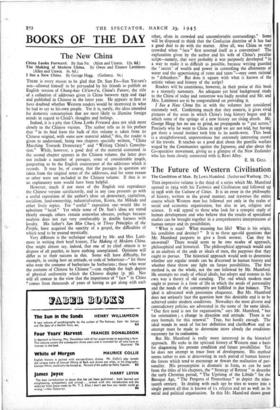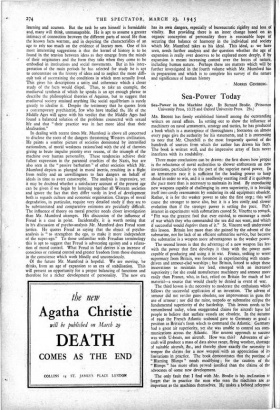The Future of Western Civilisation
The Condition of Man. By Lewis Mumford. (Seeker and Vi,arburg. 25s.) Tins impressive volume is the third of a series which Mr. Mumford opened in 1934 with his Technics and Civilisation and followed up in 1938 with the Culture of Cities. It is an essay in the philosophy of history, written in the grand manner, and traverses the entire course which Western man has followed not only in the realm of social and economic organisation, but also in art, religion and science. It will appeal to those who look for a synoptic study of human development and who believe that the results of specialised studies can be brought together in a comprehensive interpretation of human nature and its possibilities.
"What is man? What meaning has life? What is his origin, his conditibn and destiny? " It is to these age-old questions that Mr. Mumford purports to give a fresh answer. Can they be answered? There would seem to be two modes of approach, philosophical and historical. The philosophical approach would aim at an analysis of the ends or ideals of men, the purposes that they ought to pursue. The historical approach would seek to determine whether any regular trends can be discerned in human history and whether these throw any light on future possibilities. The first method is, on the whole, not the one followed by Mr. Mumford. He attempts no study of ethical ideals, but adopts and restates in his own way a theory of old standing. The end which modern man ought to pursue is a form of life in which the needs of personality and the needs of the community are fulfilled in due balance. The ideal is advocated with passionate eloquence. But Mr. Mumford does not seriously face the question how this desirable end is to be achieved under modern conditions. Nowadays the most diverse and contradictory policies are advocated in the name of he same ideals. "Our first need is not for organisation," says Mr. Mumford, "but for orientation ; a change in direction and attitude. There is no easy formula for this renewal." True, but hardly enough. The ideal stands in need of fur.her definition and clarification and an attempt must be made to determine more closely the conditions necessary for its realisation.
But Mr. Mumford is really more interested in the historical approach. He seeks in the spiritual history of Western man a basis for diagnosing his present condition and future possibilities. Yet he does not attempt to trace lines of development. His method seems rather to aim at discovering in each period of human history the forces which tend to encourage or thwart the realisation of per- sonality. His presumption is dramatic in form, as can be seen from the titles of his chapters, the "Strategy of Retreat to describe the early Christian period, "The Uprising of the Libido" for the Baroque Age, "The Progress of Prometheus" to depict the nine- teenth century. In dealing with each age he tries to weave into a single pattern all that is known of iTs religion and art as well as its social and political organisation. In this Mr. Mumford shows great learning and acumen. But the task he sets himself is formidable and, many will think, unmanageable. He is apt to assume a greater intimacy of connection between the different parts of social life than the known facts warrant, and in depicting the characteristics of an age to rely too much on the evidence of literary men. One of his most interesting suggestions is that the kernel of history is to be found in the tension between ideas as they emerge from the minds of their originators and the form they take when they come to be embodied in institutions and social movements. But in his inter- pretation of the main periods he has selected for study he is apt to concentrate on the history of ideas and to neglect the more diffi- cult task of ascertaining the conditions in which men actually lived. This gives his descriptions a unity and coherence which a closer study of the facts would dispel. Thus, to take an example, the mediaeval synthesis of which he speaks is an apt enough phrase to describe the philosophical theories of Aquinas, but to suggest that mediaeval society attained anything like social equilibrium is surely greatly to idealise it. Despite the testimony that he quotes from a contemporary psychiatrist, few who have Studied the life of the Middle Ages will agree with his verdict that the Middle Ages had found a balanced solution of the problems connected with sexual life and that " their practice was in fact more ideal than their idealisation."
In dealing with recent times Mr. Mumford is above all concerned to disclose the roots of the dangers threatening Western civilisation. He paints a sombre picture of societies dominated by intensified nationalism, of moral weakness rationa!ised with the aid of theories giving to brute impulse priority over reason, of the triumph of the machine over human personality. These tendencies achieve their fullest expression in the paranoid cruelties cif the Nazis, but are also seen in the " passive barbarism" of other societies which Mr. Mumford depicts as plunged in moral inertia, resulting in a flight from reality and an unwillingness to face dangers on behalf of ideals in time to avert catastrophe. The analysis is impressive, yet it may be doubted whether a satisfactory account of the present age can be given if we begin by lumping together all Western societies and ignore the fact that they differ vastly in level of development both as regards culture and economic organisation. Charges of moral degradation, in particular, require very detailed study if they are to be substantiated and comparative estimates are peculiarly difficult. The influence of theory on moral practice needs closer investigation than Mr. Mumford attempts. His discussion of the influence of Freud is a case in point. Incidentally, it is worth noting that in his discussion of psycho-analysis Mr. Mumford does Freud scant justice. He quotes Freud as saying that the object of psycho- analysis is "to strengthen the ego, to make it more independent of the super-ego." To those unfamiliar with Freudian terminology this is apt to suggest that Freud is advocating egoism and a relaxa- tion of moral control. What Freud in face desires is' an increase of conscious or rational control and greater freedom from those elements in the conscience which work blindly and unconsciously.
Of the future Mr. Mumford is hopeful. We are moving, he thinks, from an age of expansion to an era of stabilisation. This will present an opportunity, for a proper balancing of functions and therefore for a richer development of personality. The new era has its own dangers, especially of bureaucratic rigidity and loss of vitality. But providing there is an inner change based on an organic conception of personality there is reasonable hope of securing that balance or harmony in the individual and society which Mr. Mumford takes as his ideal. This ideal, as we have seen, needs further analysis and the question whether the age of expansion is really over deserves to be explored more deeply, if by expansion is meant increasing control over the forces of nature, including human nature. Perhaps these are matters which will be further investigated in the fourth volume which Mr. Mumford has in preparation and which is to complete his survey of the nature and significance of human history
MORRIS GINSBERG.



























 Previous page
Previous page